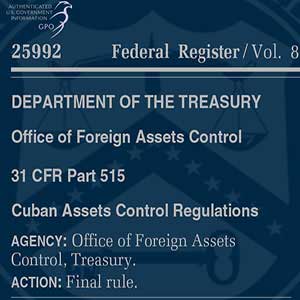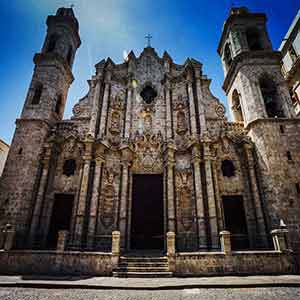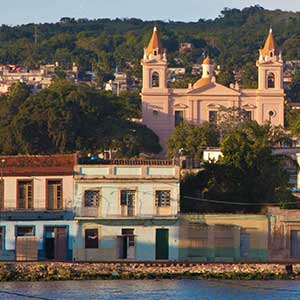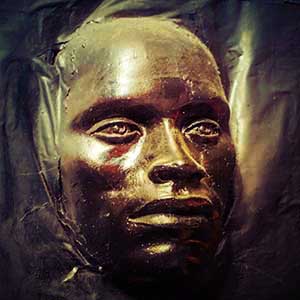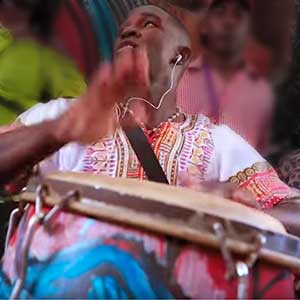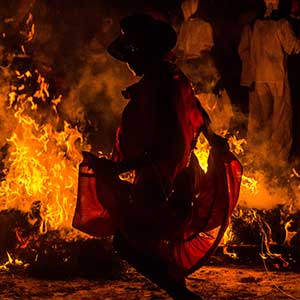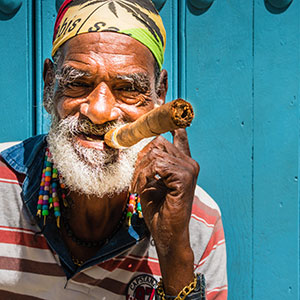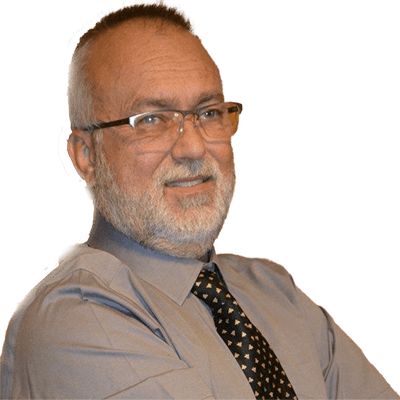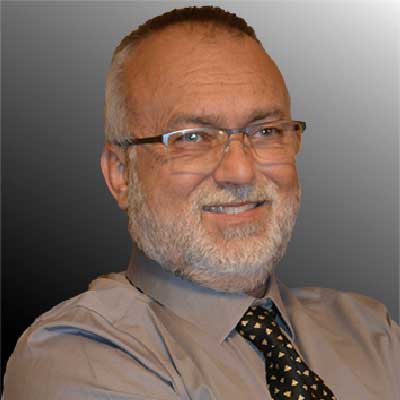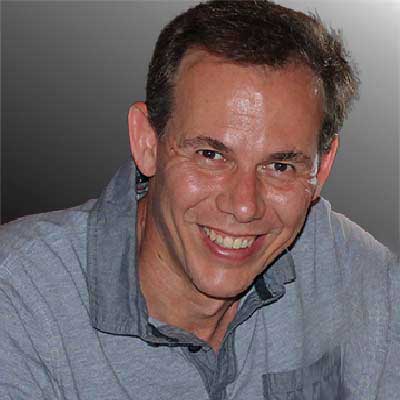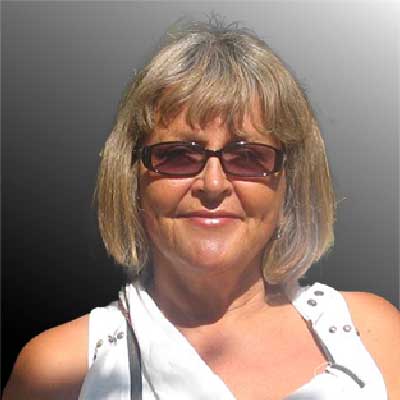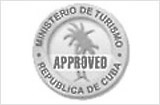African Heritage in Cuba Tour
The African Heritage in Cuba Tour is designed to shed light on the African heritage of the largest island in the Caribbean while exploring the realities of contemporary Cuban society
From October 4 to October 10, 2025
Explore the UNESCO World Heritage Site of Old Havana and travel to Matanzas City, whose archives contain some of the longest-running records of Africans in Cuba for $2,699 (all taxes included)
Discover colonial towns such as Guanabacoa, inhabited by the descendents of slaves who worked the fields here, and has kept alive its old Afro-Cuban traditions and religions; enjoy a ferryboat ride across Havana harbor to the Regla, an Afro-Cuban community with a long, rich and still active tradition of African-inspired religions; and much more!
The African Heritage in Cuba Tour aims to illuminate the rich African heritage of Cuba, the largest island in the Caribbean, while also examining the realities faced by contemporary Cubans, particularly those of African descent.
Estimates of the percentage of individuals of African descent in Cuba vary significantly, ranging from 33.9% to 62%. This variation is largely attributed to self-identification, as census data depends on how individuals choose to define their racial identity.
Like many Latin American and Caribbean nations, Cuba has a considerable population of 'mulatos' or people of mixed ethnicity, where race, class, and social status are closely intertwined. Few Cubans can be categorized as strictly 'white' or 'black,' and the definitions of racial identity are shaped by both social dynamics and physical traits. Afro-Cubans are primarily concentrated in the eastern regions of the island and in specific neighborhoods of Havana.
In light of these factors, the significant outflow of 'white' Cubans has led to an increase in the proportion of Afro-Cubans within the overall population, with estimates indicating they may now represent nearly 70% of the total.
Following the Cuban Revolution in 1959, all forms of formal discrimination and institutional racism were abolished. The sweeping economic and social reforms that followed greatly benefited the majority of Afro-Cubans, who had previously occupied the lowest rungs of the social hierarchy. Access to housing, education, and healthcare improved significantly, and the representation of black individuals in various professions expanded. Afro-Cuban women, in particular, have gained from the revolution's progressive social policies, enjoying enhanced employment opportunities.
Afro-Cubans are also notably represented in Cuba's teams at international sporting events, including baseball and various athletic competitions, and play a crucial role in shaping and promoting Cuba's national cultural identity on the global stage.
Please, check the day-by-day below
Origins of Cuban African Groups
The first enslaved Africans arrived in Cuba in 1513, primarily to replace the rapidly declining indigenous Taino-Arawak labor force, who had been forced into servitude. From 1520 onward, larger groups of Africans began working in the island's mines. Similar to the situation in nearby Hispaniola, maroon communities—groups of escaped enslaved people—emerged almost immediately.
The earliest recorded revolt of enslaved Africans in Cuba occurred in 1533 at the Jobabo mines. Following this, there were numerous uprisings, with many participants fleeing into the mountains and joining forces with indigenous Taino groups to establish independent settlements known as Palenques. From these enclaves, they launched raids on Spanish settlements.
Mining activities eventually declined due to the discovery of abundant precious metals in Mexico and South America, but Cuba retained its significance for other reasons. Its strategic location along the Windward Passage, which connects the North Atlantic Ocean to the Caribbean Sea, made it a crucial part of the New World's trade routes. Gold, silver, and emeralds from Spanish mining centers in Bolivia, Peru, and Mexico were transported to Havana for the final leg of their journey to Spain.
As the capital of Cuba, Havana became a key transshipment hub, which diminished local interest in sugar production in the surrounding countryside. Consequently, there were no large plantations, and the enslaved African population was employed in urban occupations in Havana. They worked in various roles, including loading and unloading ships, construction (as shipbuilders, carpenters, and stonemasons), and as domestics, merchants, small shopkeepers, and street vendors. This urban employment laid the groundwork for the Afro-Cuban population.
Havana also held a monopoly on local trade, being the only port authorized to ship goods to Spain. Its prosperity made it a target for pirates and rival colonial powers throughout the 16th and 17th centuries, although the importation of enslaved Africans was limited during this time.
A significant influx of Africans began in the late 1700s, particularly after the British captured Havana from Spain during the Seven Years' War and occupied the city and port from 1762 to 1763. During this period, the British brought approximately 10,000 Africans to Cuba, primarily to work in the sugar factories (ingenios) in the surrounding areas.
After Spain regained control in 1763, trade restrictions were reinstated. However, in 1789, the Spanish government was compelled to designate Havana as the exclusive port for the buying and selling of enslaved Africans. Resistance among Africans continued to grow, leading to the formation of militia groups in 1796 tasked with hunting down escaped slaves and dismantling the Palenques, which had become bases for attacks on plantations.
The remaining trade restrictions were lifted with the Royal Decree of Graces in 1815, issued by the Spanish Crown. This decree encouraged Spaniards and later non-Spanish Europeans to settle in Cuba and Puerto Rico, promoting the use of slave labor to revitalize agriculture and attract new settlers. As a result, a new class of planters began arriving from various European countries in search of enslaved labor.
Consequently, the number of Africans arriving in Cuba surged, increasing the enslaved African population from approximately 10-25% in the 18th century to over 40% by 1840. By 1839, Cuba had become the world's largest sugar producer, and Havana emerged as the largest market for enslaved Africans in the Caribbean, importing around 10,000 slaves annually.
Cuba evolved into a highly structured plantation society, characterized by rigid class and caste systems, where cruelty towards Africans became commonplace. The ongoing expansion of slavery in 19th-century Cuba sparked significant resistance, which in turn provoked harsh reprisals from European powers. As a result, uprisings persisted throughout the 1830s.
Between 1810 and 1870, Cuba acquired approximately 600,000 enslaved individuals. Despite Britain's prohibition of the Transatlantic Slave Trade, Africans continued to be sold into slavery in Havana's markets until the last slave ship arrived in 1867. Cuba was also the last Caribbean territory to abolish slavery, doing so in 1886.
This backdrop of continued resistance among enslaved individuals is intricately linked to the struggle for Cuban independence, which would later inspire and contribute to the Cuban Revolution. Afro-Cubans played a significant role in the War of Independence (1895-1898), led by José Martí, which ultimately ended Spanish colonial rule. However, while the 1901 constitution guaranteed formal equality for all Cubans, those in power pursued a policy of blanqueamiento (whitening), inviting 400,000 new Spanish immigrants to Cuba between 1902 and 1919, making it the most Spanish-influenced country in Latin America.
Cuba’s rich musical heritage rooted in African rhythm
Cuban music with African roots originates from the diverse musical practices of various ethnic groups from West and Central Africa, who were enslaved and brought to the island between the 16th and 19th centuries. Some of these groups established ethnic associations known as cabildos, which played a crucial role in preserving their cultural traditions, including music. This African musical heritage, intertwined with significant Spanish influences, is foundational to Cuban music.
A large portion of this music is linked to traditional African religions such as Lucumi and Palo, and it retains elements of the languages spoken in the original African homelands. The music is transmitted through oral tradition and is often performed at private gatherings that are not easily accessible to outsiders. Instead of melodic instruments, it emphasizes polyrhythmic percussion, vocal call-and-response, and dance. Similar to other musically vibrant nations in the New World, including the United States, Brazil, and Jamaica, Cuban music embodies a rich African musical legacy.
Can American Citizens Join This Tour to Cuba?
Any US citizen or permanent resident genuinely interested in supporting the Cuban people can travel to Cuba from USA legally. Supporting the Cuban people by patronizing privately owned restaurants, stores, art galleries and other small businesses; and supporting the work of independent Cuban organizations is the main intend of this Cuba tour.
Even though Cuba tourism is not possible for US citizens, the Cuban Heritage in Cuba tour is a legal option to visit Cuba under the General License for the Support for the Cuban People.
The Support for the Cuban People General License for US travel to Cuba is created through a do it yourself process rather than by submitting an application and awaiting approval. Fast, free and convenient, a General License for Support for the Cuban People simply requires US individuals to prepare their own documentation in a way that meets all OFAC guidelines.
Notice: As of June 5 2019, all US travelers traveling to Cuba from USA are required by law to fill out a justification travel form (travel affidavit form) for the U.S. Department of the Treasury- Office of Foreign Assets Control (Cuba Travel Regulations).
We provide our US travelers with all the required documentation to ensure they are in compliance with Biden administration’s rules on Cuba travel under the US Cuba Travel category: Support for the Cuban People.
US travelers can choose to depart to Cuba from any US port of their choosing
Authentic Cuba Travel® has developed the the Cuban Heritage in Cuba tour program in cooperation with Cuban nongovernmental organizations, community projects and individuals that promote independent activity in Cuba. In compliance with current OFAC (Office of Foreign Assets Control) guidelines for the Support for the Cuban People General License (515.574 (a)), our itinerary consists on a full-time schedule of activities that will enhance the contact with the Cuban people, and support civil society and private entrepreneurial activity in Cuba; and that will result in meaningful interactions in between the US travelers and the Cuban people they meet along the way.
US individual travelers can not engage in financial transactions with Cuban entities which are under the control of, or act for or on behalf of, the Cuban military, intelligence, or security services. We keep our itineraries updated to make sure that American travelers are not directly or indirectly dealing with any of these prohibited entities. For the complete Cuba Restricted List, please visit:
https://www.state.gov/division-for-counter-threat-finance-and-sanctions/cuba-restricted-list
US travelers are responsible for maintaining all Cuba travel records for up to 5 years and for showing (if asked) evidence that they have engaged in authorized activities while in Cuba (staying at accommodations not listed in the Restricted List of Cuban entities, eating at privately-owned restaurants, shopping at privately-owned art galleries and stores, ect). Free time in excess or regular tourists' activities are not permitted.
At Authentic Cuba Travel®, we take care of all details both in North America and in Cuba, including VISA and flight arrangements to Cuba's main destinations via USA ports (Miami, Tampa, Fort Lauderdale, Houston, New York, Los Angeles, and others) or through third countries like Canada and Mexico. Authorized US travelers can travel through a third country subject to the same restrictions and requirements as those flying directly from USA.
Read what past travelers say about their experience with us, CLICK HERE.
Cuba Education Tours
Want to Take Your Students to Cuba?
Authentic Cuba Travel® operates courses, programs and exchanges sponsored by Cuba’s top educational schools and organizations such as the University of Havana, Cuba's National Ballet School, Cuba's Sports Ministry, San Alejandro’s Arts School, Insituto Cubano de La Musica, Conjunto Folklórico Nacional de Cuba. Request custom-made no-obligation Cuba Study Tours® for your students and check all the resources we put at your service. Do not wait any longer. Now is the time to start planning the next Cuba tour for your students.
Cuba Study Trips
-
Cuba Business Tours & Travel
Explore Cuba's Economy and Private Business Sector
-
Cuba Healthcare Tours & Travel
Professional Research Cuba's Medical System & Healthcare Model
-
Cuba Cultural Tours & Travel
Discover the Wonders of Cuba’s UNESCO World Heritage Sites
-
Cuba Nature Tours & Travel
Visit UNESCO Biosphere Reserves, National Parks & Protected Areas
-
Cuba Architecture Tours & Travel
Explore America’s largest & best preserved Spanish Historical Cities
-
Cuba Catholic Tours & Travel
Exchange with Cubans at Cathedrals, Churches & Social Projects
Cuba School Programs
-
Spanish Immersion Course
Spanish Course sponsored by the University of Havana
-
Ballet Training Course
Ballet Course sponsored by Cuba's National Ballet School
-
Sports Training Exchange
Sports Trainning sponsored by Cuba's Sports Ministry
-
Arts Educational Program
Arts Program sponsored by San Alejandro’s Arts School
-
Jazz Performance
Sponsored by the Havana Jazz Festival’s Organizing Committee
-
Dance Workshops
Sponsored by Conjunto Folklórico Nacional de Cuba
Percentage of Cubans of African Descent
Estimates regarding the percentage of individuals of African descent within the Cuban population vary widely, ranging from 33.9% to 62%. This discrepancy is partly due to self-identification, as census data relies on how Cubans choose to define their own racial identity. Similar to many countries in Latin America and the Caribbean, Cuba has a substantial population of 'mulatos' or individuals of mixed ethnicity, where color, class, and social status are intricately connected. Few Cubans can be classified as strictly 'white' or 'black.' The definitions of 'color' are influenced as much by social factors as by physical characteristics. Afro-Cubans are predominantly found in the eastern regions of the island and in certain neighborhoods of Havana. Considering these factors, the significant emigration of 'white' Cubans has resulted in Afro-Cubans now representing a larger segment of the population, with estimates suggesting they may account for nearly 70% of the total.
What's Included?
- Support for the Cuban People General License Documentation (for USA Travelers).
- Full-Time Schedule of Support for the Cuban People Activities.
- Tour of UNESCO World Heritage Site, Havana Historical Centre.
- Travel to Matanzas City, known for its Afro-Cuban Folklore.
- 6 Nights at 5-Star Quinta Avenida Hotel by Valentin Hotels in Havana.
- 13 Meals at Cuba’s finest privately-owned Restaurants: 6 Breakfasts, 5 Lunches & 2 Dinners.
- Ferryboat ride to the Regla, a town with a long and still active tradition of African-inspired religions.
- Explore the town of Guanabacoa, where the inhabitants have preserved Afro-Cuban traditions and religions.
- Panoramic tour around Modern Havana in privately-owned Vintage Cars.
- Exchange at House of Africa Museum (Casa de Africa) featuring a diverse ethnographic collection from Africa.
- Exchange at the Slave Route Museum (Museo de la Ruta del Esclavo) at San Severino Castle.
- Visit Havana Compas, a dance and percussion Company fusing flamenco and Afro-Cuban rhythms.
- Meet with staff members the community development project AfroAtenas.
- Rumba performance and dancing at Callejon de Hamel.
- Exchange with the privately-run art gallery known as La Factoria.
- Attend one of the most traditional ceremonies in Cuba, the Fire of the Cannon of 9 O'Clock at the Fortress of La Cabana.
- Guided tour of Museum of Fine Arts, Cuban Collection.
Expert’s Corner
Hello! I’m Bernt Dietmar. Over 20 years ago, I visited Cuba as part of a delegation of American scientists interested in exploring opportunities for research and business collaboration. I was surprised by Cuba’s high academic standards, and the methods used in the educational system. We founded Authentic Cuba Travel® to show that Cuba is more than another Caribbean tourism destination and promote the understanding in between Cuba and North America. I kindly invite you to join us. We'll explore UNESCO World Heritage Sites, exchange with Cubans, partake in local food dishes, music, rum, and much more!
Cuban Festivals
Every year Cuba’s International Festivals brought travellers to Cuba from all over the world. Every year Authentic Cuba Travel® makes sure that those attending international events such as the Havana Jazz Festival, the Havana Book Fair, the Havana Film Festival, the Havana Art Biennial, the Fire Festival, the Havana Ballet Festival or the Habano Cigar Festival get the most out of their Cuba travel experience and get to know the authentic Cuba.
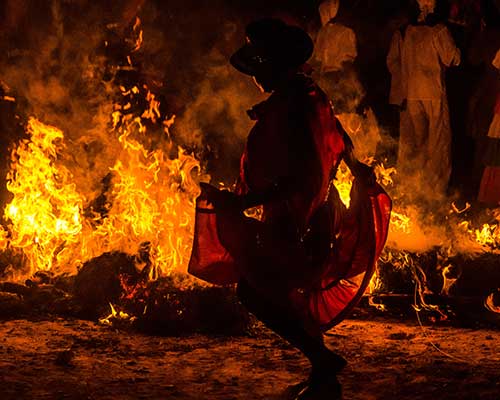
Cuba Fire Festival
Organized by Casa del Caribe, the annual Cuba Fire Festival will take place in Santiago de Cuba from July 3, 2025 to July 9, 2025. With musical venues at 50 locations and city streets lined with bars and stalls, rum-fuelled revellers get in the festival spirit as live bands, musicians and DJs keep crowds at fever pitch well into the nighttime hours.
Book NowCuba Fire Festival
Organized by Casa del Caribe, the annual Cuba Fire Festival will take place in Santiago de Cuba from July 3, 2025 to July 9, 2025. With musical venues at 50 locations and city streets lined with bars and stalls, rum-fuelled revellers get in the festival spirit as live bands, musicians and DJs keep crowds at fever pitch well into the nighttime hours.
Book Now
Havana Film Festival
The Havana Film Festival promotes the cinematographic works of Spanish- language filmmakers from Latin America, Spain and Cuba. It is sponsored by the Cuban Institute of the Cinematographic Art and Industry, ICAIC. The 46th edition of the Festival International del Nuevo Cine Latinoamericano will take place from December 4, 2025 to December 14, 2025.
Book NowHavana Film Festival
The Havana Film Festival promotes the cinematographic works of Spanish- language filmmakers from Latin America, Spain and Cuba. It is sponsored by the Cuban Institute of the Cinematographic Art and Industry, ICAIC. The 46th edition of the Festival International del Nuevo Cine Latinoamericano will take place from December 4, 2025 to December 14, 2025.
Book Now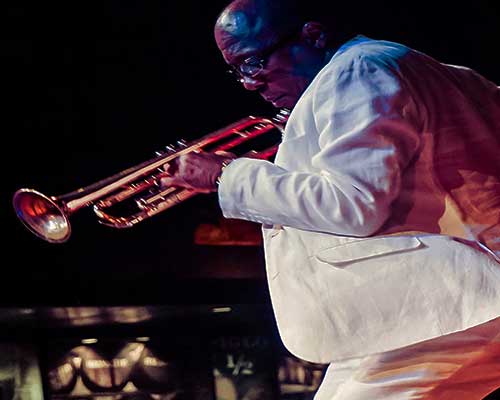
Havana Jazz Festival
The 41st International Jazz Festival of Havana, which is sponsored by famed Cuban jazz artist Chucho Valdes and ICM, or the Cuban Institute of Music, will be held in numerous locations throughout La Habana from January 25, 2026 to February 1, 2026. More than 100 international bands have joined Cuba’s top Jazz musicians in previous festivals.
Book NowHavana Jazz Festival
The 41st International Jazz Festival of Havana, which is sponsored by famed Cuban jazz artist Chucho Valdes and ICM, or the Cuban Institute of Music, will be held in numerous locations throughout La Habana from January 25, 2026 to February 1, 2026. More than 100 international bands have joined Cuba’s top Jazz musicians in previous festivals.
Book Now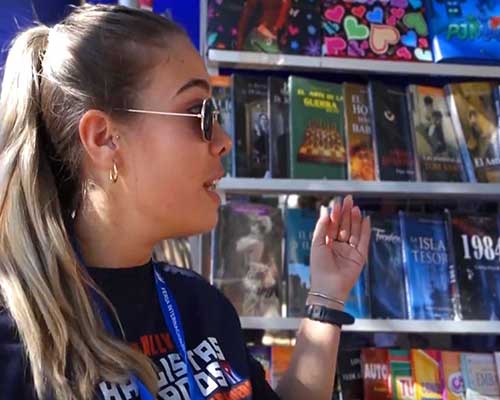
Havana Book Fair
The 34th International Book Fair of Havana will take place in Havana City from February 12 to February 22, 2026. Along with the public, the book fair is attended by Cuban and international authors, publishers, and political officials. Organized by the Cuban Book Institute, the fair transforms the Spanish fortification La Cabana into one of the biggest book parties in the world.
Book NowHavana Book Fair
The 34th International Book Fair of Havana will take place in Havana City from February 12 to February 22, 2026. Along with the public, the book fair is attended by Cuban and international authors, publishers, and political officials. Organized by the Cuban Book Institute, the fair transforms the Spanish fortification La Cabana into one of the biggest book parties in the world.
Book Now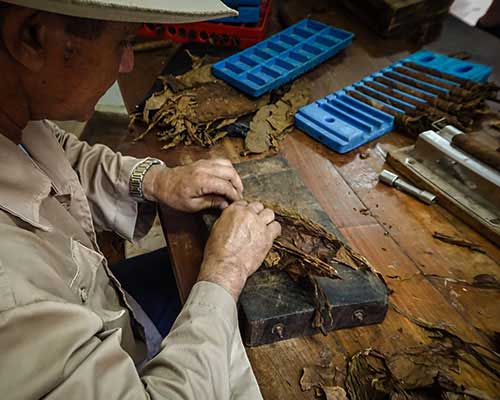
Habano Cigar Festival
Considered by many to be the world’s biggest premium cigar celebration, the XXVI Cigar Festival of Cuba will take place from February 23 to February 27, 2026. The Habano Cigar Festival's Exhibit Fair at Palacio de Las Convenciones regularly attracts some 1500 producers, distributors and businessmen, as well as large numbers of Cigar aficionados and tourists.
Book NowHabano Cigar Festival
Considered by many to be the world’s biggest premium cigar celebration, the XXVI Cigar Festival of Cuba will take place from February 23 to February 27, 2026. The Habano Cigar Festival's Exhibit Fair at Palacio de Las Convenciones regularly attracts some 1500 producers, distributors and businessmen, as well as large numbers of Cigar aficionados and tourists.
Book Now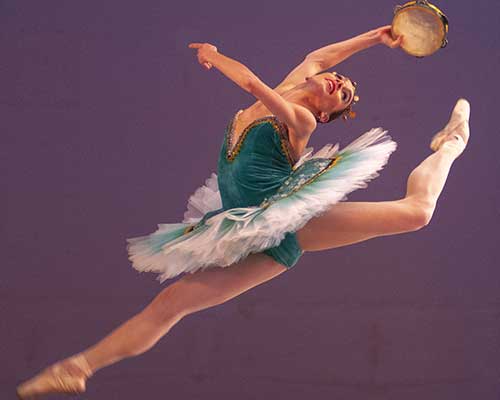
Havana Ballet Festival
The 29th Anniversary of the International Ballet Festival of Havana Alicia Alonso will take place from October 28 to November 6, 2026. Dancers, ballet companies, and choreographers from across the world look forward to the event, which is hosted by Cuba’s National Ballet at the Great Theatre of Havana, the Karl Marx Theatre and the Mella Theatre.
Book NowHavana Ballet Festival
The 29th Anniversary of the International Ballet Festival of Havana Alicia Alonso will take place from October 28 to November 6, 2026. Dancers, ballet companies, and choreographers from across the world look forward to the event, which is hosted by Cuba’s National Ballet at the Great Theatre of Havana, the Karl Marx Theatre and the Mella Theatre.
Book Now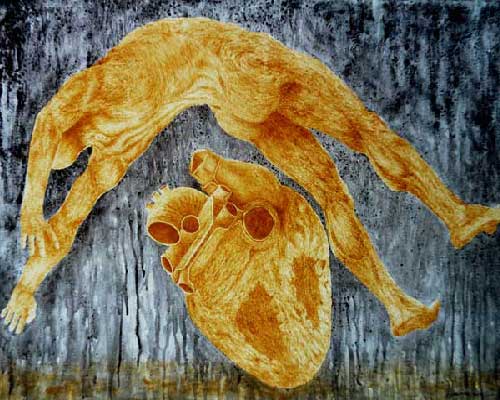
Havana Art Biennial
The 16th Havana Art Biennial will take place from November 15, 2027 to February 28, 2028. The rooster of international and national visual artists will include more than 200 creators from about 20 countries. According to the Wifredo Lam Art Center (organizing institution), the festival will turn the city into an interactive cultural corridor between the creators and public.
Book NowHavana Art Biennial
The 16th Havana Art Biennial will take place from November 15, 2027 to February 28, 2028. The rooster of international and national visual artists will include more than 200 creators from about 20 countries. According to the Wifredo Lam Art Center (organizing institution), the festival will turn the city into an interactive cultural corridor between the creators and public.
Book Now






CUBA TOUR FINDER
Select your authentic Cuba trip from over 70 Cuba tours in seconds. Sort by departure date, price, destination and even Cuba travel theme.
QUICK CUBA TOUR FINDERCuba Tour Itinerary
-
Day 1. Saturday 4 October 2025. Hello Cuba 
Arrival at "Jose Marti" International Airport in Havana.
Group welcomed by your Cuban guide and bus driver for the entire tour.
Private transfer to your hotel Valentin Quinta Avenida (Valentin 5th Avenue).
The luxurious 186-room Valentin Quinta Avenida was previously operated by US Starwood Hotels & Resorts. In 2016, this hotel opened as the Four Points Havana becoming the first American hotel in Cuba after the Revolution. The hotel is currently managed by the Valentin Hotel Group, a hotel chain based in Mallorca, Spain.
5-Star Valentin Quinta Avenida (Valentin 5th Avenue)
Address: 5ta Ave, e/ 76 y 80, Miramar, Playa, Havana, Cuba.
Postal Code: 11300.
Telephone: (+53 7) 214 1470 Ext. 8070 & 8071 / (+53 7) 214 1476
On route we’ll enjoy a panoramic visit to the Revolution Square (Plaza de la Revolucion). Conceived by French urbanist Jean Claude Forestier in the 1920s, the gigantic square today is the base of the Cuban government and a place where large-scale political rallies are held.
It is here where Popes John Paul II, Benedict XVI and Francis celebrated an open air Mass during their visits to Cuba in January 1998, March 2012 and September 2015 respectively. The Square was also visited by US President Barack Obama during his historic visit to Cuba in March 2016.
Group check-in.
This evening we’ll enjoy a welcome dinner at the family-run restaurant Paladar Atelier.
Breakfast is complimentary from 7:00 a.m. to 10:00 a.m. -
Day 2. Sunday 5 October 2025. The Afro-Cuban Community of Regla Morning: ferryboat ride across Havana harbor to the municipality of Regla. This Afro-Cuban community has a long, rich and still active tradition of African-inspired religions.
We'll visit Regla's church dedicated to the black "Virgen de Regla" Yemayá, the African goddess of the sea in the santeria religion and the patron saint of sailors.
Tour of Regla's municipal museum to learn the origins of this unique community and its Afro-Cuban cultures.
Followed by a panoramic tour around Modern Havana in privately-owned vintage cars. These classic cars range from 55 to 85 years old, featuring dream cars from the 1950s. The portfolio includes nearly every brand you can think of, such as Cadillac, Ford, Buick, Chevrolet, Mercury and Chrysler.
We are now "leaving" Havana and entering Jose Fuster, the studio, residence and wild kingdom of José Rodriguez Fuster, one of the most important Cuban ceramists and painters today. Complimentary lunch will be hosted by the artist himself in his personal residence and privately-owned studio-art gallery. Hence, supporting the Cuban people by patronizing privately owned restaurants, stores, art galleries and other small businesses.
Afternoon: we will meet with Professor Alberto Faya for a demonstrative lecture on the African heritage through Cuban Music. Mr. Faya has been working as a singer, composer, guitarist, professor of Music, and researcher within the Cuban musical world for over 30 years.
Cuban music with African roots originates from the diverse musical practices of various ethnic groups from West and Central Africa, who were enslaved and brought to the island between the 16th and 19th centuries. Some of these groups established ethnic associations known as cabildos, which played a crucial role in preserving their cultural traditions, including music. This African musical heritage, intertwined with significant Spanish influences, is foundational to Cuban music.
A large portion of this music is linked to traditional African religions such as Lucumi and Palo, and it retains elements of the languages spoken in the original African homelands. The music is transmitted through oral tradition and is often performed at private gatherings that are not easily accessible to outsiders. Instead of melodic instruments, it emphasizes polyrhythmic percussion, vocal call-and-response, and dance. Similar to other musically vibrant nations in the New World, including the United States, Brazil, and Jamaica, Cuban music embodies a rich African musical legacy.
Evening: we will visit FABRICA DE ARTE- The Factory of Art (F.A.C.). This is one of Havana’s finest new art spaces located in a converted factory in Vedado neighborhood. It is the brainchild of Afro-Cuban rocker, rapper, composer and filmmaker X Alfonso. X is the son of Carlos Alfonso and Ele Valdés, founders of the famous Afro-Cuban symphonic rock group Síntesis. Celebrities Mick Jagger, Michelle Obama, Lady Gaga, Sting and Katy Perry have visited here. Return to your private rental accomodation. -
Day 3. Monday 6 October 2025. Exploring Old Havana, a UNESCO World Heritage Site Afternoon: guided tour of the Museum of Fine Arts' Cuban Collection where we see the evolution of Cuba's visual arts over the last 300 years. The collection accounts for the richness of our Spanish, French, Chinese, African cultural roots.
Followed by a visit to House of Africa Museum (Casa de Africa) in Old Havana. The Casa de Africa Museum opened on January 6, 1986, featuring a diverse ethnographic collection from Africa, with over two thousand artifacts, including wooden sculptures and ivory pieces.
Housed in a building from 1887, which originally served as residential quarters and a tobacco warehouse, the museum is located in Old Havana. It was established to raise awareness about slavery in Cuba and its societal impacts, contributing to the creation of the Museum of the Slave Route and the preservation of the Old Triunvirato Sugar Mill.
Today, Casa de África is a key center for research and community projects related to the African diaspora and its influence in Cuba and the Americas. It offers a museum and gallery, cultural activities, tours, scientific research, a specialized library, and community engagement. A significant event is the annual Scientific Workshop of Social Anthropology and Afro-American Cultures, which honors Don Fernando Ortiz and provides a platform for Africanists to share their research and for visual artists to exhibit their work.
Lunch: a new wave of paladares (privately-owned restaurants) has recently swept the Cuban dining scene offering excellent food and charming ambient. Today we’ll enjoy a welcome lunch at the stylish Paladar San Cristobal, one of Havana's top ten private restaurants.
Afternoon: guided walking tour of UNESCO World Heritage Site, Old Havana.
Visit to the Cathedral Square, named after the masterpiece of Cuban baroque architecture: the Cathedral of Havana built by the Jesuit order.
Just up the southwest corner of Plaza de La Catedral, we find the Experimental Printing Workshop. Next we will meet with a cooperative of young artists who work tirelessly, shirtless in an airy, spacious colonial building where we can see original prints being created.
Visit to Square of Arms, ancient military parade ground for Spanish soldiers and surrounded by impressive buildings such as:
Palacio de los Capitanes Generales, the former official residence of the governors (Captains General) of Havana, Cuba. It is home to the Museum of the City of Havana. It houses exhibitions of art and historical artefacts and many of the rooms are preserved with their original Colonial decoration.
Palacio del Segundo Cabo. The seat of the second authority of the island. Today it houses important publishing concerns.
Castillo de la Real Fuerza. The second oldest fortress built by the Spaniards in the West Indies. The castle was recently renovated and reopened in June 2008 to hold the impressive maritime museum. Well laid out exhibits chart Spain and Cuba's naval history.
Visit to Plaza Vieja, the only civic square of colonial times. Notice it doesn't have a church or government building around. Here we will visit important institutions for visual arts.
Continue walking tour onto San Francisco Square, named after the Convent of San Francisco, this square was conceived in 1628, with the objective of supplying water to the ships trading with the metropolis. For many years it also served to stockpile the goods arriving from the harbor.
Free time in the famous handicraft market of Old Havana where you can purchase all sorts of crafts and souvenirs by local artisans.
Evening: attend one of the most traditional and popular ceremonies in Cuba, Fire of the Cannon of 9 O'Clock at the Fortress of San Carlos de La Cabana where Che Guevara established his headquarters after the Revolution came to power in 1959. -
Day 4. Tuesday 7 October 2025. Race Relations in Cuba Today Morning: We will meet with Gisela Arandia Covarribias, an author and researcher on issues of race in Cuba and a long-time anti-racism activist. Presentation on Black Women in Cuba today and the future of race relations in Cuba. This is a great opportunity for questions and answers.
Like many Latin American and Caribbean nations, Cuba has a considerable population of 'mulatos' or people of mixed ethnicity, where race, class, and social status are closely intertwined. Few Cubans can be categorized as strictly 'white' or 'black,' and the definitions of racial identity are shaped by both social dynamics and physical traits. Afro-Cubans are primarily concentrated in the eastern regions of the island and in specific neighborhoods of Havana.
Next we visit Callejón de Hamel, an alley where all the buildings display murals inspired by Afro-Cuban culture and religions. This is the work of Salvador Gonzales Escalona, a well known Cuban muralist, painter, and sculptor. He has murals in Philadelphia, New York and Norway.
Lunch at El Aljibe restaurant serving the best Creole food in Cuba. El Aljibe made an appearance on Anthony Bourdain’s TV show No Reservations; and is famous for its roast chicken served with a special secret sauce.
Afternoon: we will be treated to a private visit to the studio of Cuban painter and engraver Eduardo Roca, known as Choco.
Choco received the 2017 National Prize for Visual Arts for his significant contributions to the island's visual arts. His work is showcased in prestigious museums and galleries worldwide, including Cuba's Museo Nacional de Bellas Artes, the DuSable Museum in Chicago, the Museo de la Estampa in Mexico, the Kochi Museum in Japan, the Miró Foundation in Palma de Mallorca, and various Swedish institutions.
Choco is an expert in printing techniques, particularly collagraphy. His art is deeply influenced by African religion and its lasting impact on Cuban culture, evident in the physical features and textures of his human figures and the overall atmosphere of his compositions.
Followed by visit to Beyond Roots, an Afro-style store that wanted to change the Cuban stereotype of rum, cigars and beautiful mulata women, and replaced it with messages of love for Black culture. They design their own line of key chains, mugs, T-shirts, with phrases such as “Yo amo la cultura afrocubana” (I love Afro-Cuban culture).
Evening: Enjoy a performance of the world famous Legendarios del Guajirito. This cultural project is dedicated to preserving traditional Cuban music. Some of its musicians are former members of the Buena Vista Social Club and the Afro-Cuban All Stars. The band includes 7 Grammy Award winners and 4 Latin Grammy Award winners. (Optional – Not included in tour cost) -
Day 5. Wednesday 8 October 2025. Matanzas City, known for its Afro-Cuban Folklore Morning: day trip to Matanzas City known for its poets, culture, and Afro-Cuban folklore, it is located on the northern shore of the island of Cuba, on the Bay of 90 km east of the capital Havana and 32 km west of the resort town of Varadero.
Rest stop in Bacunayagua Bridge for a Piña Colada and enjoy the view over the highest bridge (110 mts) in Cuba, one of the marvels of Cuban post- revolutionary architecture.
In the 19th century, Matanzas emerged as the center of Cuban sugar production, leading to a significant demand for slave labor and becoming the primary destination for African slaves in Cuba. This historical context explains why Matanzas houses the most important documents related to the history of enslaved Africans and their descendants in the country.
The region's archives contain some of the longest-running records of Africans in Cuba, offering a wealth of information from the early 16th century to the late 19th century. These records include demographic statistics, details on ethnicity, resistance, occupations, and the economy of both free and enslaved Africans. This documentation originated from colonial Spanish administration, churches, estates, and notary offices.
Upon arrival we visit the Slave Route Museum (Museo de la Ruta del Esclavo) at San Severino Castle. Exhibition halls retell the sad and violent history of slave trade which forcibly transported close to twenty million Africans to the Americas. The San Severino Castle, one of the Spanish fortresses built in colonial Cuba in the 17th century, houses four exhibition halls: the house of the commander, the archeological hall, the hall of Slavery, and the hall of the Orishas or African deities.
Lunch at a local family-run restaurant.
Afternoon: Next we visit the Callejon de las Tradiciones (Ally of Traditions) displaying murals that celebrate the African culture and heritage. The ally is run by the community development project AfroAtenas. We’ll meet with staff members to learn about their social work in the area.
Free time at Varadero Beach to enjoy the beach (time permitting).
Evening: we suggest you go to the privately-owned restaurant Coco Blue & La Zorra Pelua. Created by famous Cuban artist José Emilio Fuentes Fonseca (JEFF) this place offers great ambiance with live music, food, bar and an art gallery. (Optional – Not included in tour cost) -
Day 6. Thursday 9 October 2025. Guanabacoa, an Afro-Cuban Community in Havana Morning: visit to the colonial town of Guanabacoa. Once a small sugar and tobacco center, Guanabacoa is inhabited primarily by the descendents of slaves who worked the fields here, and has kept alive its old Afro-Cuban traditions and religions.
We’ll tour the Museo Municipal de Guanabacoa. Founded in 1964, the museum tracks the development of the neighborhood throughout the 18th and 19th centuries and is famous for its rooms on Afro-Cuban culture, slavery and the Santería religion.
Lunch at the family-run restaturant paladar Arrecife.
Afternoon: visit to the headquarters of Havana Compas, a Cuban dance and percussion company fusing flamenco and Afro-Cuban rhythms. It is the first of its kind in the island. The work of Habana Compass Dance attracts international personalities. U.S. singer Usher and the vocalist of the British band The Rolling Stones, Mick Jagger, have visited its headquarters. We wil exchange with students and dance instructors.
Evening: Farewell dinner at the family-run restaurant paladar La Cocina de Lilian. La Cocina de Lilliam is a pioneering paladar that opened its doors in Havana during the 1990s, a time when private restaurants were first allowed in Cuba. This beloved establishment is run by the remarkable Sra. Lilliam, celebrated for her exceptional Cuban culinary skills. If you're seeking an authentic taste of Cuban cuisine, La Cocina de Lilliam is a must-visit. The paladar gained significant recognition when former President Jimmy Carter dined there during his visit to Havana. -
Day 7. Friday 10 October 2025. Departure Early morning departure to Havana City International Airport for departure.
Cuba Themed Tours
If you’ve got an idea of which style of trip will suit you best, take a look at our different trip themes below, as there’s something to suit everyone. Not only are there themed tours to fit any budget and interest, each Authentic Cuba Travel® experience immerses you in the authentic Cuba so hard to explore while just staying in full packed beach resorts.
Festival Tours
Our festival tours give travelers VIP access to all venues and happenings of Cuba’s famous international events such as the Havana Jazz Festival, Book Fair, Ballet Festival and others.
Study Tours
Through peer to peer interaction, our Cuba Study Tours® transcend ordinary tourism by immersing American students in the local culture, history, politics, music and contemporary arts.
Cultural Tours
Cuba Pathfinder® is your gateway to discover the unique Cuban cultural heritage, a set of traditions & memories not showcased in museums but much alive & thriving.
Architecture Tours
An architectural passage through Cuba’s best preserved colonial cities and unique architectural heritage, our architecture tours visit all UNESCO World Heritage Sites in Cuba.
Photography Tours
Capturing stirring pictures of authentic Cuban destinations it is not the only mission of our photography tours. Capture the essence of the Cuban culture and the kindness of its people.
Educational Tours
Our educational tours represents a great opportunity for K-12 teachers, university & college professors to explore Cuba’s education system while exploring colonial cities, towns and villages.
Nature Tours
An odyssey into Cuba's tropical paradise, our nature & bird watching tours gain access to the most pristine natural sites, from UNESCO Biosphere Reserves to National Parks.
Jewish Tours
A journey into the Jewish history in Cuba, our tours will strengthen the ties between Cuban Jewish communities and North American Jews. All while visiting 4 UNESCO World Heritage Sites!
Sports Tours
What sets our sports tours apart are the private exchanges with players, coaches & staff as well as sports journalists & personalities. Then you have best seats at the games!
List of Cuba Tours 2025
-
Tour Name
Tour Dates
Cost
-
Photography Tour I
Havana, Vinales, Trinidad
Apr 5- Apr 12, 2025
$2,629 Book Now
-
The Nature of Cuba
Havana, Vinales, Trinidad
Apr 5- Apr 14, 2025
$2,799 Book Now
-
Real Cuba Tour 4
Havana, Las Terrazas, Vinales
Apr 5- Apr 12, 2025
$2,599 Book Now
-
Cuba Engage Tour 4
Havana, Bay of Pigs, Trinidad
Apr 5- Apr 12, 2025
$2,599 Book Now
-
4 Biosphere Reserves
Rosario, Zapata, Buenavista
May 2- May 11, 2025
$2,999 Book Now
-
Real Cuba Tour 5
Havana, Las Terrazas, Vinales
May 10- May 17, 2025
$2,599 Book Now
-
Cuba Engage Tour 5
Havana, Bay of Pigs, Trinidad
May 10- May 17, 2025
$2,599 Book Now
-
Photography Tour II
Havana, Vinales, Trinidad
Jun 7- Jun 14, 2025
$2,629 Book Now
-
Cuba Art Explorer II
Havana, Cienfuegos, Trinidad
Jun 7- Jun 14, 2025
$2,599 Book Now
-
Cuba Education Tour 5
Havana, Cienfuegos, Trinidad
Jun 7- Jun 14, 2025
$2,599 Book Now
-
Real Cuba Tour 6
Havana, Las Terrazas, Vinales
Jun 7- Jun 14, 2025
$2,599 Book Now
-
Cuba Engage Tour 6
Havana, Bay of Pigs, Trinidad
Jun 7- Jun 14, 2025
$2,599 Book Now
-
Cuba Fire Festival
Havana, Santiago de Cuba
Jul 3- Jul 10, 2025
$2,799 Book Now
-
Real Cuba Tour 7
Havana, Las Terrazas, Vinales
Jul 5- Jul 12, 2025
$2,599 Book Now
-
Cuba Engage Tour 7
Havana, Bay of Pigs, Trinidad
Jul 5- Jul 12, 2025
$2,599 Book Now
-
Cuba Business Tour 2
Havana, Matanzas, Varadero
Jul 5- Jul 12, 2025
$2,599 Book Now
-
Healthcare Cuba Tour 2
Havana, Cienfuegos, Trinidad
Jul 5- Jul 12, 2025
$2,599 Book Now
-
Cuba Education Tour 6
Havana, Santiago de Cuba
Jul 5- Jul 12, 2025
$2,799 Book Now
-
Cuba Education Tour 7
Havana, Las Terrazas & Vinales
Jul 12- Jul 19, 2025
$2,599 Book Now
-
Jews of Cuba Travel
Havana, Santa Clara, Cienfuegos
Aug 7- Aug 14, 2025
$2,799 Book Now
-
Real Cuba Tour 8
Havana, Las Terrazas, Vinales
Aug 9- Aug 16, 2025
$2,599 Book Now
-
Cuba Engage Tour 8
Havana, Bay of Pigs, Trinidad
Aug 9- Aug 16, 2025
$2,599 Book Now
-
Photography Tour III
Havana, Vinales, Trinidad
Aug 9- Aug 16, 2025
$2,629 Book Now
-
Cuba Education Tour 8
Havana, Cienfuegos, Trinidad
Aug 9- Aug 16, 2025
$2,599 Book Now
-
Cuba Art Explorer III
Havana, Vinales
Aug 9- Aug 16, 2025
$2,599 Book Now
-
Cuba Legal Travel
Havana, Vinales
Aug 9- Aug 16, 2025
$2,799 Book Now
-
Cuba Architecture I
Havana, Cienfuegos, Trinidad
Aug 9- Aug 16, 2025
$2,599 Book Now
-
Seven Cities II
Havana, Santiago de Cuba
Aug 9- Aug 20, 2025
$3,329 Book Now
-
Real Cuba Tour 9
Havana, Las Terrazas, Vinales
Sep 6- Sep 13, 2025
$2,599 Book Now
-
Cuba Engage Tour 9
Havana, Bay of Pigs, Trinidad
Sep 6- Sep 13, 2025
$2,599 Book Now
-
Baseball Tour
Havana, Cienfuegos, Trinidad
Sep 6- Sep 13, 2025
$2,999 Book Now
-
African Heritage
Havana, Las Terrazas, Vinales
Oct 4- Oct 10, 2025
$2,699 Book Now
-
Real Cuba Tour 10
Havana, Las Terrazas, Vinales
Oct 4- Oct 11, 2025
$2,599 Book Now
-
Cuba Engage Tour 10
Havana, Bay of Pigs, Trinidad
Oct 4- Oct 11, 2025
$2,599 Book Now
-
Dance Cuba Tour
Havana, Las Terrazas
Oct 4- Oct 11, 2025
$2,599 Book Now
-
Performing Arts Tour
Havana, Cienfuegos, Trinidad
Oct 4- Oct 11, 2025
$2,599 Book Now
-
Jo Jazz Havana
Havana, Las Terrazas, Vinales
Nov 5- Nov 12, 2025
$2,799 Book Now
-
Seven Cities I
Havana, Santiago de Cuba
Nov 6- Nov 17, 2025
$3,329 Book Now
-
Cuba Nature Tour
Havana, Vinales, Trinidad
Nov 7- Nov 16, 2025
$2,799 Book Now
-
Real Cuba Tour 11
Havana, Las Terrazas, Vinales
Nov 8- Nov 15, 2025
$2,599 Book Now
-
Cuba Engage Tour 11
Havana, Bay of Pigs, Trinidad
Nov 8- Nov 15, 2025
$2,599 Book Now
-
Cuba Business Tour 3
Havana, Matanzas, Varadero
Nov 8- Nov 15, 2025
$2,599 Book Now
-
Healthcare Cuba Tour 3
Havana, Cienfuegos, Trinidad
Nov 8- Nov 15, 2025
$2,599 Book Now
-
Havana Film Festival
Havana, Vinales
Dec 8- Dec 15, 2025
$2,899 Book Now
-
Real Cuba Tour 12
Havana, Las Terrazas, Vinales
Dec 26- Jan 2, 2026
$2,599 Book Now
-
Cuba Engage Tour 12
Havana, Bay of Pigs, Trinidad
Dec 26- Jan 2, 2026
$2,599 Book Now
-
Cuba Education Tour 9
Havana, Cienfuegos, Trinidad
Dec 26- Jan 2, 2026
$2,599 Book Now
-
Cuba Education Tour 10
Havana, Bay of Pigs, Santa Clara
Dec 26- Jan 2, 2026
$2,599 Book Now
-
Cuba Education Tour 11
Havana, Santiago de Cuba
Dec 26- Jan 2, 2026
$2,799 Book Now
-
Bird Watching Tour
Havana, Zapata, Trinidad
Dec 26- Jan 2, 2026
$2,599 Book Now
-
Cuba Architecture II
Havana, Cienfuegos, Trinidad
Dec 26- Jan 2, 2026
$2,599 Book Now
-
Cuba Art Explorer IV
Havana, Las Terrazas
Dec 26- Jan 2, 2026
$2,599 Book Now
-
Photography Tour IV
Havana, Vinales, Trinidad
Dec 26- Jan 2, 2026
$2,729 Book Now
-
Jewish Heritage Tour
Havana, Cienfuegos, Trinidad
Dec 26- Jan 2, 2026
$2,799 Book Now
-
Family Discovery Tour
Havana, Cienfuegos, Trinidad
Dec 26- Jan 2, 2026
$2,699 Book Now
-
Real Cuba Tour 1
Havana, Las Terrazas, Vinales
Jan 10- Jan 17, 2026
$2,599 Book Now
-
Cuba Engage Tour 1
Havana, Bay of Pigs, Trinidad
Jan 10- Jan 17, 2026
$2,599 Book Now
-
Cuba Jazz Festival
Havana, Cienfuegos, Trinidad
Jan 25- Feb 2, 2026
$3,099 Book Now
-
Santiago Jazz Festival
Santiago de Cuba
Jan 25- Feb 1, 2026
$2,899 Book Now
-
Havana Jazz Festival
Havana, Vinales
Jan 28- Feb 2, 2026
$2,499 Book Now
-
Havana Book Fair
Havana, Cienfuegos, Trinidad
Feb 13- Feb 20, 2026
$2,799 Book Now
-
Real Cuba Tour 2
Havana, Las Terrazas, Vinales
Feb 7- Feb 14, 2026
$2,599 Book Now
-
Cuba Engage Tour 2
Havana, Bay of Pigs, Trinidad
Feb 7- Feb 14, 2026
$2,599 Book Now
-
Habano Cigar Festival
Havana, Vinales
Feb 21- Feb 28, 2026
$2,999 Book Now
-
Cuba Education Tour 1
Havana, Cienfuegos, Trinidad
Feb 21- Feb 28, 2026
$2,599 Book Now
-
Cuba Education Tour 2
Havana, Cienfuegos, Trinidad
Feb 28- Mar 7, 2026
$2,599 Book Now
-
Cuba Al Natural
Havana, Zapata, Trinidad
Mar 7- Mar 18, 2026
$2,859 Book Now
-
Cuba Business Tour 1
Havana, Matanzas, Varadero
Mar 7- Mar 14, 2026
$2,599 Book Now
-
Healthcare Cuba Tour 1
Havana, Cienfuegos, Trinidad
Mar 7- Mar 14, 2026
$2,599 Book Now
-
Real Cuba Tour 3
Havana, Las Terrazas, Vinales
Mar 7- Mar 14, 2026
$2,599 Book Now
-
Cuba Engage Tour 3
Havana, Bay of Pigs, Trinidad
Mar 7- Mar 14, 2026
$2,599 Book Now
-
Cuba Art Explorer I
Havana, Vinales
Mar 7- Mar 14, 2026
$2,599 Book Now
-
Bird Watching Tour
Havana, Zapata, Trinidad
Mar 7- Mar 14, 2026
$2,599 Book Now
-
Cuba Education Tour 3
Havana, Cienfuegos, Trinidad
Mar 7- Mar 14, 2026
$2,599 Book Now
-
Cuba Education Tour 4
Havana, Vinales
Mar 14- Mar 21, 2026
$2,599 Book Now
-
Cuba Ballet Festival
Havana, Vinales
Oct 31- Nov 7, 2026
$2,999 Book Now
-
Havana Art Biennial
Havana, Vinales
Dec 11- Dec 18, 2027
$2,799 Book Now
SUBSCRIBE
Be in the know and sign up for email updates from Authentic Cuba Travel®. Our monthly Newsletters are full of great information for art teachers, art curators, photographers, artists, performing arts & theatre professionals, dancers and those travellers interested in Cuban culture & arts. Last minute discounts on Cuba cultural tours, contests and featured cultural travel opportunities. All to keep you up to date with the cultural world of Authentic Cuba Travel®.
NewsletterMemberships & Affiliations
Bella Travel Group Ltd. (Federal Corporation number: 765324-7) owns and operates the following registered trademarks: Authentic Cuba Travel® is a trademark registered at the Canadian Intellectual Property Office (CIPO), Registration No. TMA975677 | Cuba Pathfinder® is a trademark registered at the Canadian Intellectual Property Office (CIPO), Registration No. TMA997988 | Cuba Pathfinder® is a trademark registered at the United States Patent and Trademark Office (USPTO), Registration No. 5498353 | Cuba Study Tours, Make Cuba Your Classroom® is a trademark registered at the United States Patent and Trademark Office (USPTO), Registration No. 5833051.

 1-877-280-2054 (North America)
1-877-280-2054 (North America) 647-351-8191
(Worldwide)
647-351-8191
(Worldwide)
 647-351-8191
(Worldwide)
647-351-8191
(Worldwide)



